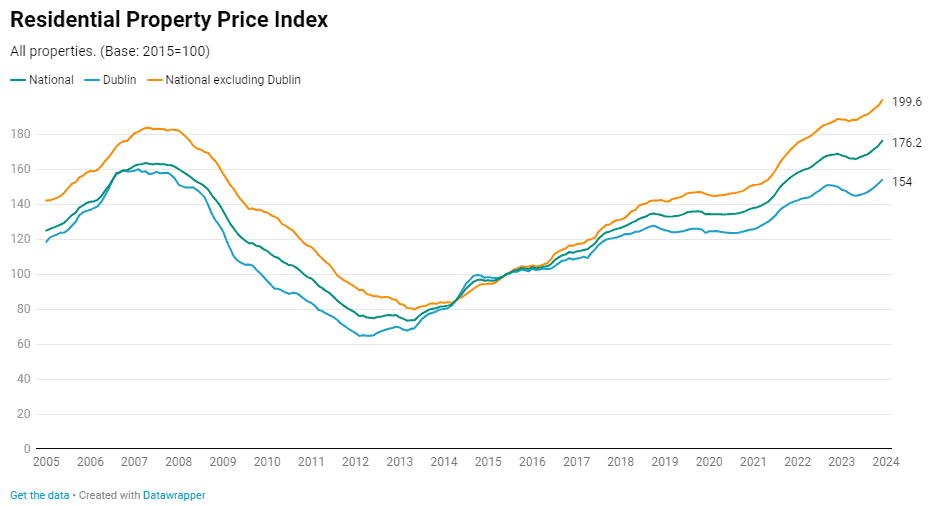Ireland
Property Market:
Rising rents, rising returns.
Historical Prices and Trends
Historical Prices:
- Despite a 2008 crash, Irish house prices have seen significant growth since 2013, exceeding pre-crisis levels.
- Recent data (Feb. 2024) shows a continued increase, with national prices up 6.1% year-on-year. Dublin prices remain highest (5.9% rise), with some areas exceeding 7%.
- The average Irish home price was around €170,000 in 2000.
- Prices surged over 200% to peak at €370,000 in 2007.
- Crashed to €165,000 by 2012 after the financial crisis.
- Currently, the average price is €295,000 as of 2024.
Yields:
- The rental market has performed strongly, with the National Rent Index reaching nearly 236 in July 2023 (a 136% increase since 2012).
- Dublin and surrounding counties experience exceptionally high rents.
- Yields in other cities like Cork and Galway are around 6-7%.
- Student housing can achieve yields over 8%.
Challenges:
- Supply shortage: Demand outpaces new housing construction, particularly in Dublin.
- Economic factors: Inflation and rising interest rates may dampen future growth.
- Potential policy changes: The proposed “no-fault eviction” ban could impact rental market dynamics.
Opportunities:
- Increased investment: Private capital is identifying buying opportunities, potentially boosting construction.
- Rising completions: 2024 may see the highest annual housing delivery since the “Celtic Tiger” period, easing supply pressure.
Foreign Investors:
- Ireland offers a stable and transparent property market.
- Potential for capital appreciation and rental income generation.
- Careful analysis of local market conditions and regulations is crucial.
Housing Stock:
- A mix of single-family homes and apartments, with a recent trend towards increased apartment building, especially in Dublin.
- Ageing housing stock requires renovation and energy efficiency upgrades.
Demand & Demographics:
- The growing population, particularly young professionals, fuels the demand for housing.
- Urbanization trends are causing pressure on major cities like Dublin.
- Affordability concerns persist, especially for first-time buyers.
Taxes on Property Investment in Ireland
Stamp Duty:
- Residential properties: 1% on properties up to €1 million, 2% on balance above €1 million
- Non-residential properties: 7.5%
Value Added Tax (VAT):
- A standard rate of 23% applies to the sale of new residential properties and commercial properties
Capital Gains Tax (CGT):
- 33% on gains from the disposal of properties not considered the primary residence
- The annual exemption of €1,270 for gains
Income Tax:
- Rental income is taxed at an individual’s marginal rate (20% or 40%)
- PRSI (Pay Related Social Insurance) of 4% also applies to rental income
Local Property Tax (LPT):
- Annual tax based on market value of property
- Rate ranges from 0.18% to 0.25% depending on property value
Non-Resident Landlord Tax:
- 20% withholding tax on rental income for non-resident landlords
Commercial Property Rates:
- Annual rates payable to local authority based on valuation of commercial property
Overall, property investment taxes in Ireland are not overly punitive for foreign investors compared to Irish residents. However, the upfront acquisition costs via stamp duty and VAT can be high, especially for commercial properties. Rental income will also face a 20% withholding tax for non-residents.
While Irish property offers potential rewards, foreign investors must consider their specific tax situation and investment goals. Consulting a tax professional is crucial for a personalized assessment.

Dublin Property Market - Demand and Investment Hotspots
Housing Demand:
- High demand driven by strong economic growth and population increases
- Shortage of housing supply, especially for affordable units
- Rents increased 10.7% year-over-year in Q4 2022
- Average Dublin rent €2,169 per month
Top Areas for Residential Investment:
- Dublin City Center: High rental demand, high prices
- Dublin 2/4 (Ballsbridge, Donnybrook): Affluent areas, convenient location
- Dublin 6/6W (Ranelagh, Rathmines): Popular with young professionals
- Dun Laoghaire: Coastal suburb, high rents
- Dublin 14/16 (Dundrum, Rathfarnham): High-demand family homes
Commercial Investment Areas:
- Dublin Docklands: Major business/tech hub
- Dublin 2/4: Prime office locations
- Dublin 18 (Sandyford): Key office/industrial park
- Dublin Airport Logistics Park: Distribution/warehousing
Risks:
- Potential overvaluation
- Interest rate increases
- Over-exposure to multinational companies
Property investment hotspots outside of Dublin:
Cork City and County:
- Strong economic growth and job creation
- More affordable than Dublin
- High rental demand, especially in the city centre
- Development of office space and residential schemes
Galway City and County:
- Attracting tech companies and startups
- High housing demand, constrained supply
- Popular suburb areas like Salthill and Oranmore
- Development lands for sale around the city
Limerick City and County:
- Revitalized city centre and Docklands
- Major employers like medical/tech firms
- More affordable residential investment
- Commercial real estate opportunities
Kildare:
- Commuter belt for Dublin workers
- Towns like Naas, Newbridge, Maynooth
- Residential and retail potential
- Lower entry prices than Dublin
Wicklow:
- Coastal towns like Bray Greystones are in demand
- The commuter base for Dublin
- Scope for holiday home/rental investments

Major New Housing Projects Across Ireland
Dublin:
- Poolbeg West (3,800 homes)
- Clongriffin (2,600 homes)
- Pelletstown (837 homes)
- Parkgate Street (484 apartments)
Cork:
- Ballinglanna (3,000 homes planned)
- Jacobs Island (620 apartments/houses)
- Horgans Quay (600 units)
Galway:
- Rahoon (600 homes)
- Westside (330 units)
- Crown Square (310 apartments)
Limerick:
- Mungret Park (850 homes)
- Coonagh Cross (512 units)
- Opera Site (184 apartments)
Kildare:
- Excellent Barn (1,300 homes)
- Ardstone Lands (1,000 homes)
- Oldtown Demesne (305 units)
Project Types:
- New suburbs/towns
- Urban regeneration sites
- Student apartment complexes
Key Developers:
- Cairn Homes, Glenveagh, Bartra, Hibernia REIT
We provide foreign investors with exclusive access to Irish real estate. With local expertise and insider connections, we offer prestigious off-market opportunities. From elite addresses to high-yield rentals, we tailor solutions to your investment goals, ensuring a distinguished ownership experience in a top real estate market.
How about dedicating a day to explore with one of us? We could organize property viewings, talk with local real estate agents, and see what development companies offer.
Invest Now
Discover the Potential of Ireland
Given Ireland’s strong economic performance, investing in the Irish property market could present opportunities. The country boasts a rich heritage, architectural merit, and a thriving economy, which may allow for potential returns through property acquisition and rental income.
Spend a day with us.
We could organize property viewings.
Explore...
It's worth exploring the property market together.
Get in touch for a friendly, no-obligation chat.




